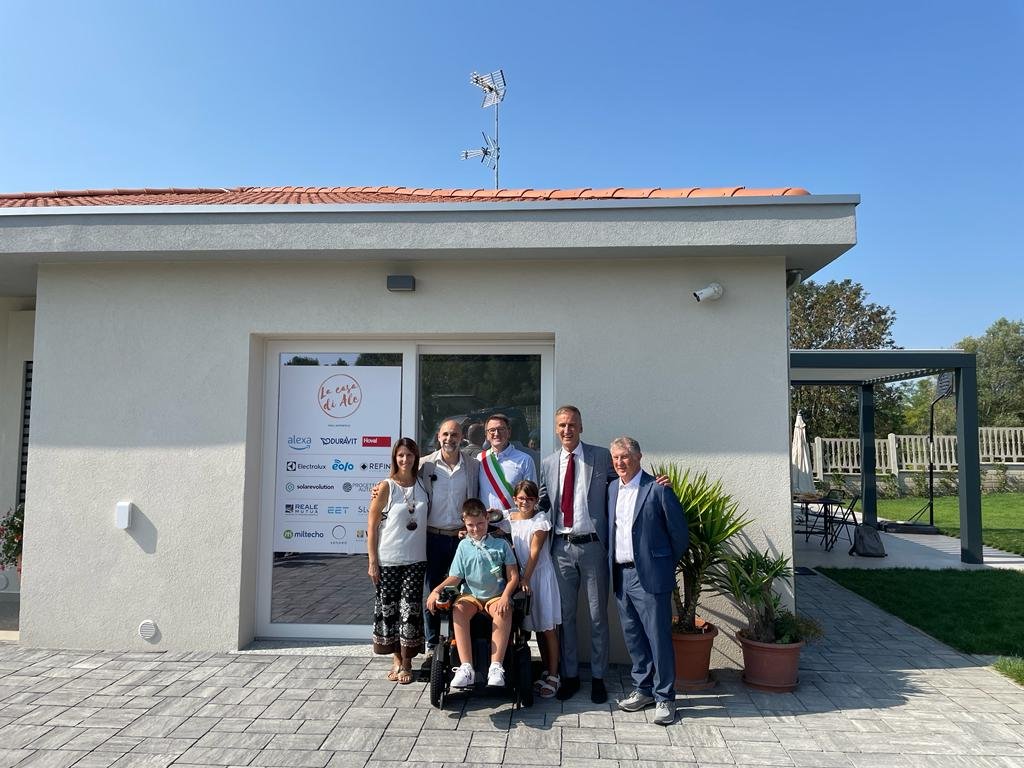Un child Alexanderstricken with a rare disease at the age of four and a father, Marco Meroni, who decides to transform pain into an initiative that is an immense proof of love for life and generosity. “La Casa di Ale” is a project that aims to create information and awareness about the issue of accessibility at home, to reach all families in the same situation as Marco and Alessandro
It was 2016 when, at the age of just four, Alessandro, a child like many others from the province of Como, was struck by the EV D-68 virus, better known as Acute flaccid myelitis. Within days Alessandro can no longer move or breathe independently.
“Imagine a tsunami: wherever it passes it brings death and destruction. You can’t know what the damage will be until the waters recede. The same principle applies to what happened to Ale,” says Marco Meroni.
From that moment on, the goal of Alessandro’s family was to give him as normal a life as possible.
“Il Volo di Ale” was born with this idea, a digital project that tells the story of Alessandro and follows his evolution and progress “Ale’s House”. Presented to the press at the beginning of September, it is a 100% accessible home that offers assistance and autonomy to Alessandro, but not only. Because it is also a house that acts as an incubator, a hub and a place of experimentation where it will bring to the ground all the innovations and technologies related to home accessibility.
“In the design of ‘La Casa di Ale’ we encountered his idea Universal Design, born in 1985 thanks to the American architect Ronald L. Mace. A concept that then evolved into the thought ‘Design for All’, or design for everyone,” continues Meroni.
From these assumptions was born a domestic space, designed by the architect Alessandro Pagani, which applies the 7 basic principles of Universal Design: Equity, Flexibility, Simplicity, Perceptibility, Tolerance to error, Containment of physical effort, Adequate measurements and spaces.

The result is a Smart Home where, through voice control of compatible devices such as lights, shutters, thermostats, mosquito nets and blinds, TV, Alessandro can carry out many of the activities that would be excluded from him in a normal home. There are many companies that supported the project: from Vimar at Electrolux, passing through Miltecho, Hoval, Solarevolution, Sonnen, Duravit and Alexa.
Thanks to his help Alexa, for example, Alessandro can make calls from his room to other rooms in case of need and, conversely, parents can also monitor him from outside. In addition, he can listen to music, play games, and even study, research, do in-depth studies, or do homework using just his voice.

“We are very proud to have supported the ‘Il Volo di Ale’ project, helping to turn the concept of accessibility into something really concrete. Our contribution aims to create a positive change in the life of Alessandro and his family, but also to raise awareness of disability and accessibility in society. In fact, for us technology is not only synonymous with innovation, but above all with improving the quality of life. We work every day to ensure that our devices and services can better meet the needs of everyone, in the name of inclusion,” he said. Giacomo Costantini, Director of Business Development at Amazon Alexa.
“La Casa di Ale” is therefore an example of how new technologies can communicate with each other, offering truly accessible home environments.
Ale’s House as a Living Lab
From a project designed specifically for Alessandro’s needs, “La Casa di Ale” will evolve into a Living Lab where he will be able to experiment with all the innovations designed to make the homes of people with disabilities more accessible.
In this sense, the house becomes a concept house with solutions and ideas for disabilities ready to be shared and explored with whoever needs them. A real space where the concepts of Universal Design and Design for All evolve.
The first project born from this idea is a robotic arm developed in collaboration with the Polytechnic University of Milan. A help for Alessandro that could be of great help to many people.
The aim of the Living Lab is actually to make ideas, projects and initiatives available.
“Today the idea is this. Who knows if we will be able to further develop our project into something even different. We believe in sharing and enabling. Pragmatism combined with a certain capacity for forward vision. To give Ale, but also to many others, many more opportunities”, concludes Marcos Meroni.

